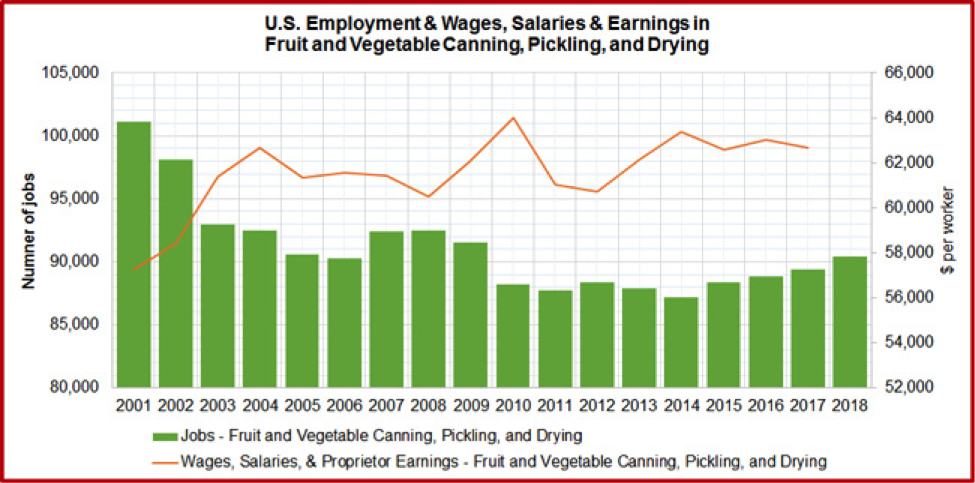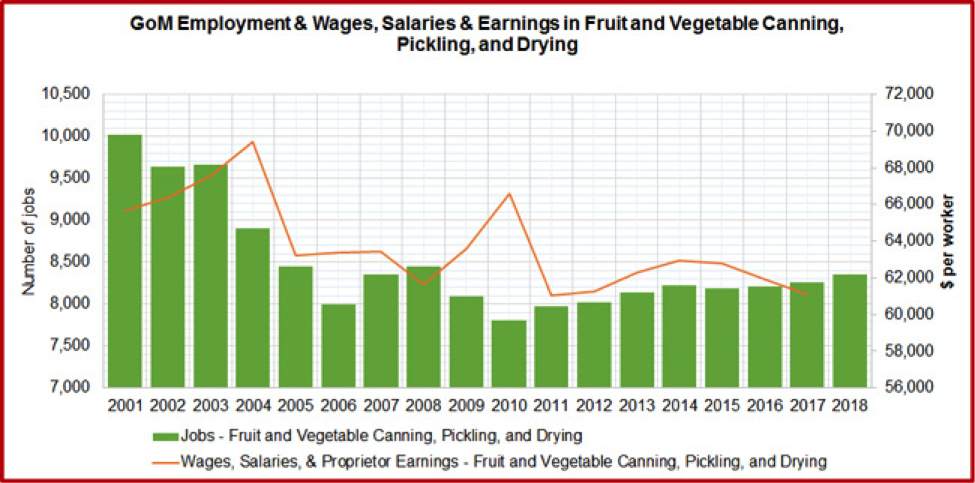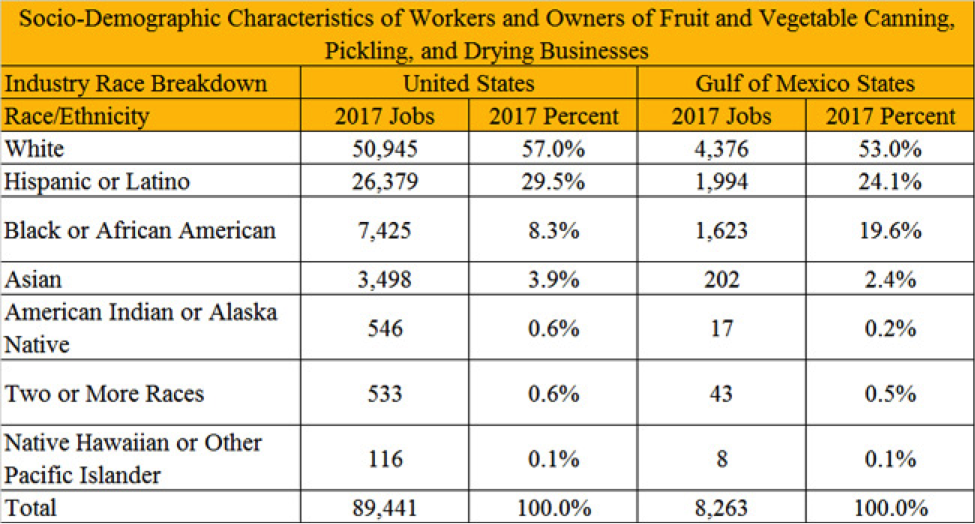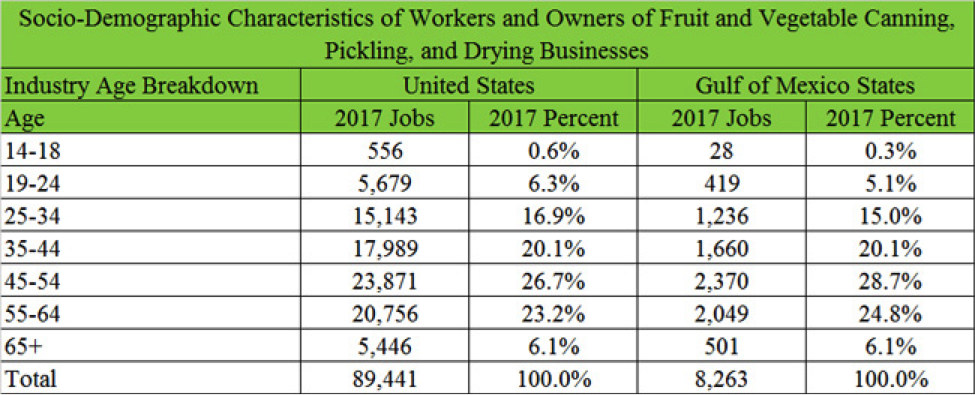Vol. 8 No. 3 | Fruit and Vegetable Canning, Pickling, and Drying Businesses
Authors
Your Extension Experts
Related News
June 30, 1995
June 2, 1995
March 31, 1995
Employment, Incomes, and Characteristics of Workers and Owners of Fruit and Vegetable Canning, Pickling, and Drying Businesses in the Gulf of Mexico and the United States. Vol. 8, No. 3, Feb. 9, 2018.
Fruit and vegetable canning, pickling, and drying (NAICS 31142) include “establishments primarily engaged in manufacturing canned, pickled, and dried fruits, vegetables, and specialty foods. Establishments in this industry may package the dried or dehydrated ingredients they make with other purchased ingredients. Examples of products are canned juices; canned baby foods; canned soups (except seafood); canned dry beans; canned tomato-based sauces, such as catsup, salsa, chili sauce, spaghetti sauce, barbeque sauce, and tomato paste; pickles and relishes; jams and jellies; dried soup mixes and bouillon; and sauerkraut.” (https://www.census.gov/eos/www/naics/index.html)
The overall trend in the number of jobs in the industry has been downward. On average the industry directly created more than 91,000 jobs per year in the United States since 2001 (Figure 1). All the Gulf of Mexico States (AL, FL, LA, MS, and TX) contributed about 9.3 percent of all the jobs during the period (Figure 2). The activities in Mississippi and Alabama during the same period added 0.24 and 0.17 percent of the total number of jobs, respectively.
The average wages, salaries, and earnings in the industry in the entire United States has been slowly rising over the period. The combined wages, salaries, and proprietor earnings (at constant 2017 prices) of all the QCEW employees, non-QCEW employees, self-employed, and extended proprietors averaged $61,544 per person during the entire period under consideration (Figure 1).
Among the workers in the industry in the Gulf of Mexico States, the average wages, salaries, and earnings have been declining more frequently during the period. The annual earnings of workers and owners in the Gulf of Mexico States during the period averaged $63,776 per person or 103.7 percent of the national average (Figure 2). During the same period, Mississippi and Alabama workers and owners received average annual pay amounting to 62.7 and 62.4 percent of the national average, respectively.


The most recent industrial overview released by EMSI (Feb. 2018) showed that among workers and owners, 61.6 percent were males (Figure 3). About 38.4 percent of the workers and owners were females. In the Gulf States, relatively more men and fewer women worked and owned these businesses.

The latest industrial overview posted by EMSI (Feb. 2018) also grouped workers and owners by race or ethnicity (Figure 4). The majority of the workers and owners are White (57%), followed by Hispanic or Latino (29.5%), and African American (8.3%). In the Gulf States, relatively more African American, and fewer White, Hispanic, and Asian people, are employed in these businesses.

The technical overview published by EMSI (Feb. 2018) also classified workers and owners by age (Figure 5). Almost three out of 10 of the workers and owners are 55 years old and above. The “45-54” year-old workers and owners consisted of 26.7 percent of the total. The “35-44” year-old group added 20.1 percent of the total. The younger workers and owners comprise 23.8 percent of the rest. The workers and owners in the Gulf States are relatively older than the national average.

If you need an online database of these businesses, you can perform the following search at the Mississippi MarketMaker (https://ms.foodmarketmaker.com/) or other member states (https://foodmarketmaker.com/):
|
States: AL, AK, AZ, AR, CA, CO, CT, DC, DE, FL, GA, HI, ID, IL, IN, IA, KS, KY, LA, ME, MD, MA, MI, MN, MS, MO, MT, NE, NV, NH, NJ, NM, NY, NC, ND, OH, OK, OR, PA, RI, SC, SD, TN, TX, UT, VT, VA, WA, WV, WI, or WY » Type: Processor/Packing Shed » Profile: Processor/Packing Shed > Fruit & Vegetable Products |
More than 1,700 local “fruit and vegetable processors” registered their business profiles in MarketMaker. Click this LINK to view the search results online. You can sort the results alphabetically, by relevance, or by the distance to your current location.
What is MarketMaker?
MarketMaker is the largest and most in-depth database of its kind featuring a diverse community of food-related businesses: buyers, farmers/ranchers, fisheries, farmers markets, processors/packers, wineries, restaurants and more. MarketMaker provides simple yet powerful search tools to connect with others across the production and distribution chain (http://ms.foodmarketmaker.com/).
MarketMaker is located at http://ms.foodmarketmaker.com/.
Ask Siri or Cortana to search for “Mississippi MarketMaker” on your smart phone.
How do you register your food business in Mississippi MarketMaker?
Click Register and type your email address and a password in the spaces under Register. Be prepared to enter information (and pictures) about your business.
What are the benefits in registering your food business in Mississippi MarketMaker?
Producers register their businesses in MarketMaker because food buyers of all types access our database to find products and services to meet their specific needs. Through MarketMaker, producers can reach more buyers and more efficiently form profitable business alliances.
How do you search for your business profile in Mississippi MarketMaker?
Click Search and type the name of your business in the space under Search MarketMaker.
How do you update your business profile in Mississippi MarketMaker?
Click Register and then click UPDATE YOUR PROFILE. Type your email address and password in the spaces under Account Login. Be prepared to enter updated information (and pictures) about your business.
MarketMaker Training Workshops
This training workshop is available upon request by a group of 6-12 producers, extension agents, state regulatory agencies staff and teachers. Each workshop will best fit the needs of the participants. Email Dr. Ben Posadas for details at ben.posadas@msstate.edu.
How do you search for local food businesses in Mississippi MarketMaker?
Click Search and type a keyword in the space under Search MarketMaker.
The MarketMaker research tool is an interactive mapping resource for identifying target markets, developing customized census profiles, and mapping food related businesses over demographic maps.
Where do you find the Market Research tool in MarketMaker?
Look for the Market Research section in MarketMaker and click Research your market now or Use previous version.